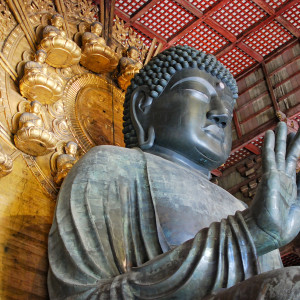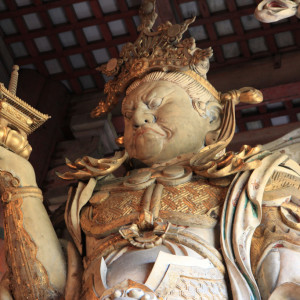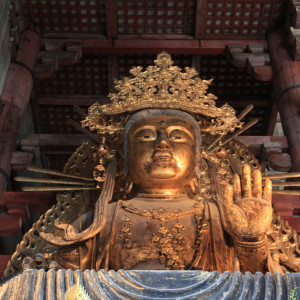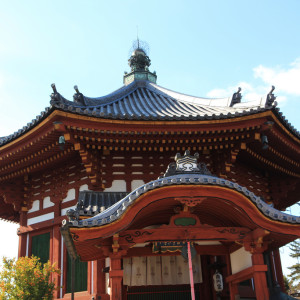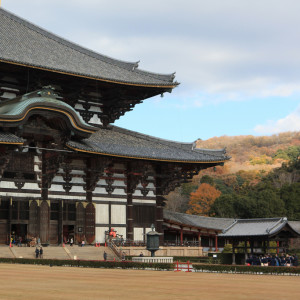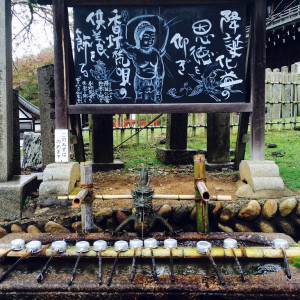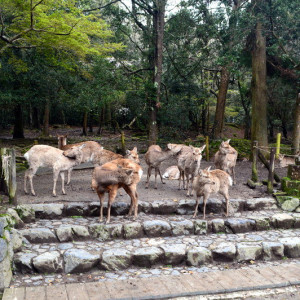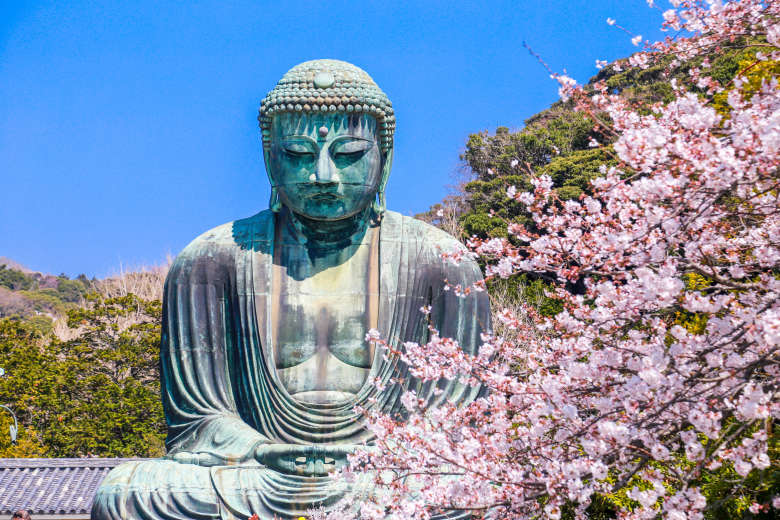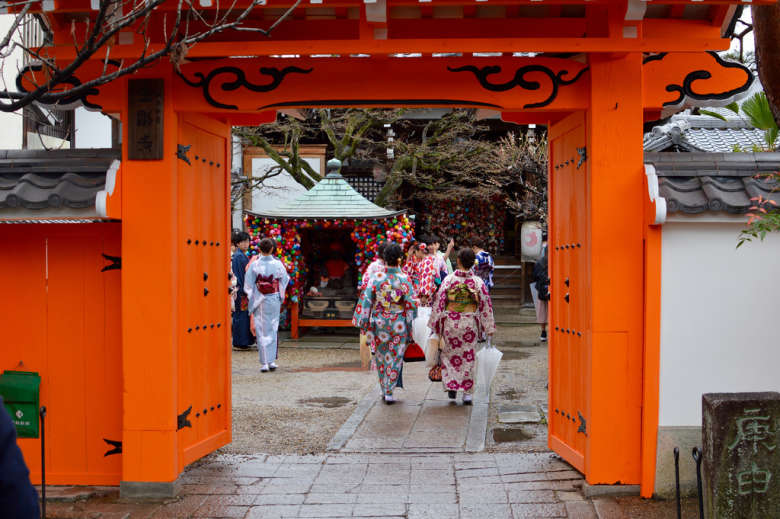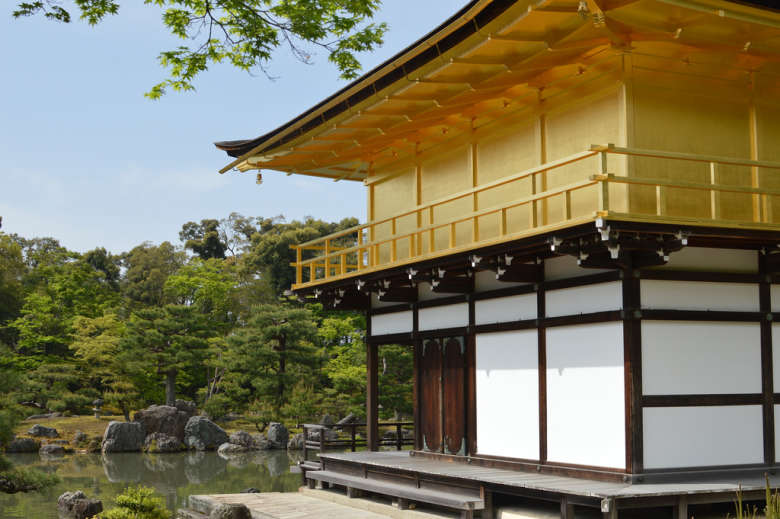Tour Details
- Duration
- 5.5 hours
- Product Type
- Tour
- Venues
-
- Kofuku-ji
- Kasuga Shrine
- Todai-ji
Select a date
Tour Description
Just a short train ride from Kyoto lies quaint Naramachi, or Nara, home to Japan's largest bronze Buddha and famous for its wild deer. In this Nara tour, a day trip from Kyoto, we'll join a local guide visiting key temples such as Todai-ji, Kasuga Shrine and Kofuku-ji and learn about the Nara period in Japanese history. Of course, we'll also drop in on the deer, famous for their comfort around humans—we may even walk up and feed a few.
"(Our guide) was an excellent guide. Spending the day with him and his warm personality and passionate knowledge was easily the highlight of our trip (and we had a series of excellent experiences!). He effortlessly answered every question we peppered him with and was just a great guy to spend an afternoon with. We were sad to see him go.
Nara Tour - Cradle of Japanese Culture
Our history lesson might begin at Temple Kofuku-ji, which has two pagodas and four great halls, inside one of which is a gleaming gilded Buddha. Although Kofuku-ji dates back to 669 (when it was built by a woman hoping her husband would recover from illness), the temple was actually built in Kyoto and then moved to Nara in 710. We will visit the Central Golden Hall (also known as ‘Chukondo’) which is the main building of Kofukuji. Originally built in the Tenpyo era, the Central Golden Hall was destroyed by war and fire, and it was rebuilt in 2018.
Kasuga Shrine
We'll also visit Kasuga Shrine (Kasuga-taisha), a Shinto shrine dedicated to protecting the city of Nara (for more on Japan's culture of temples and shrines, try our Synchronized Spirituality Tour). The shrine has thousands of stone lanterns lining its entry path and within are hundreds of bronze lanterns, donated by worshippers. Anyone who has visited Fushimi Inari shrine in Kyoto will immediately recognize Kasuga shrine’s orange torii gates.
The Giant Buddha
Our Nara tour wraps up at temple Todai-ji, a Buddhist temple dating back to 750. It's home to the world’s largest Bronze Buddha Vairocana (a celestial Buddha). In Japanese, this Buddha is known simply as “Giant Buddha” (Daibutsu). It’s believed that more than 350,000 people worked on the Great Buddha’s construction. Todai-ji is the last stop on our tour, but we encourage you to have lunch or spend some of the afternoon visiting Nara's other attractions.
Take Aways
After our visit, we will have a better understanding of the importance of this historical city and the relevance of its temples and shrines. (To learn more, read our blog post on How to Tackle Nara).
FAQ
Where does it meet? Where does it end?
We meet near Kyoto Station. The tour ends in Nara. You can return to Kyoto after the tour (the guide usually returns after the tour) or stay and get lunch and explore Nara on your own.
I have a JR Pass, can I use it instead of the Kintentsu train ticket that the guide will buy for me?
No, the JR Pass trains will take you to a further (and different) station, extending unnecessarily the tour duration and disrupting the tight schedule. The Kintetsu train instead is a lot more convenient for reaching the places that you visit on the tour. By booking our walks all clients must adhere to our procedures to ensure the success of the tour. As this is a walking-intensive tour, using the Kintetsu train line is the best solution.
What train ticket is included in the price of the tour?
A one-way train ticket from Kyoto and Nara is included in the price of the tour, which will be bought for you by your guide on-site. Our intention is to allow you to have the opportunity to stay and explore Nara on your own after the tour ends.
Is it okay to tip my guide in Japan?
We meet near Kyoto Station. The tour ends in Nara. You can return to Kyoto after the tour (the guide usually returns after the tour) or stay and get lunch and explore Nara on your own.
I have a JR Pass, can I use it instead of the Kintentsu train ticket that the guide will buy for me?
No, the JR Pass trains will take you to a further (and different) station, extending unnecessarily the tour duration and disrupting the tight schedule. The Kintetsu train instead is a lot more convenient for reaching the places that you visit on the tour. By booking our walks all clients must adhere to our procedures to ensure the success of the tour. As this is a walking-intensive tour, using the Kintetsu train line is the best solution.
What train ticket is included in the price of the tour?
A one-way train ticket from Kyoto and Nara is included in the price of the tour, which will be bought for you by your guide on-site. Our intention is to allow you to have the opportunity to stay and explore Nara on your own after the tour ends.
Is it okay to tip my guide in Japan?
Yes. Context clients generally tip anywhere from 10-25% of the purchase price of a personal service such as this, depending on the quality of the experience and their tipping habits.
Experts
Where You'll Start
–
52 Reviews
Reviews can only be left by Context customers after they have completed a tour. For more information about our reviews, please see our FAQ.
Our tour to Nara was greatly enhanced by our guide Marc. He’s well prepared and deeply knowledgeable and able to provide crucial context and explanations about the relevant history, architecture, and art, including how it was made, how it evolved and its significance. Also, as a European who came here years ago and is raising his children here and deeply involved in many Japanese pursuits, it was extremely interesting for us to be able to talk to him about his experiences and observations. We would highly recommend any tour he leads.
Daniel
May 28, 2024
Marcin was a wonderful guide! Very informative and helpful, even in the rain!
Cody
May 13, 2024
This was our best day in Japan!! Nara is a must and our guide was perfect in every way. He had an extensive knowledge of the area, fun facts about the deer that bow, and a wonderful kindness as he showed us all the sites. Thank you
Andrea
May 7, 2024
